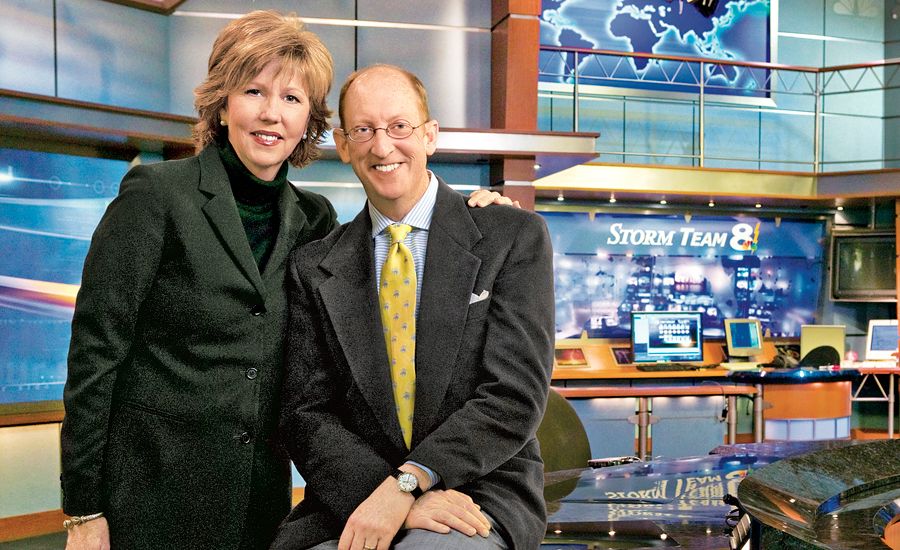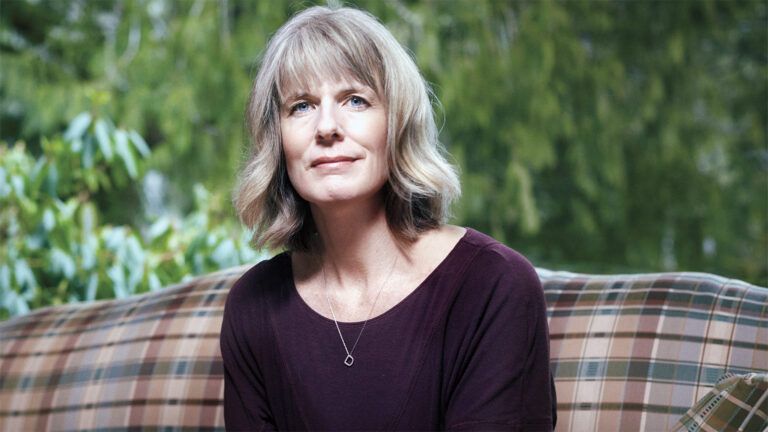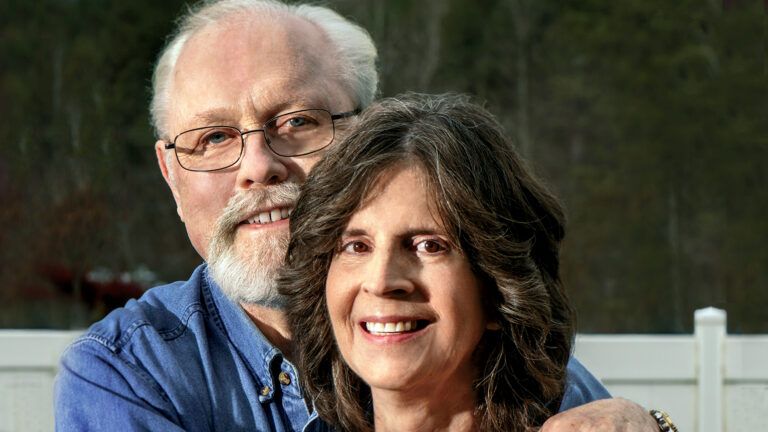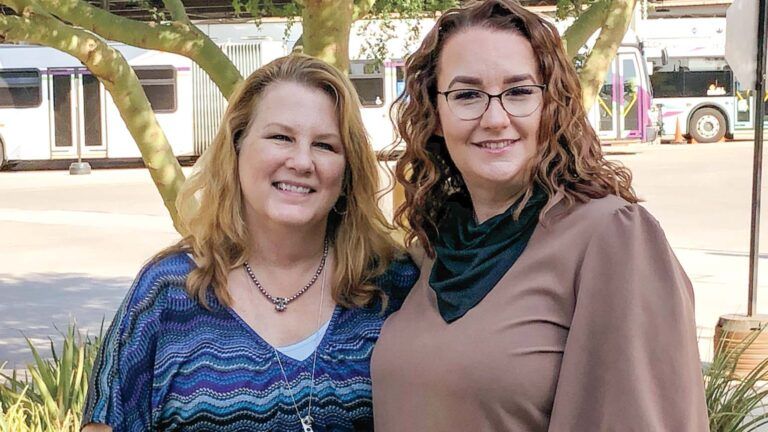The offer burst out in a bustling hospital corridor. It was the best—the only—thing I could do.
Minutes before, I had stood at the bedside of one my colleagues, Lance Williams, a reporter at WFLA, the Tampa, Florida, television station where I’m a local news anchor. Lance, a talented, Emmy Award-winning newsman and father of two young children, had leukemia.
I almost didn’t recognize him. The young, tireless reporter I knew, adept at putting together compelling human-interest stories, was gone. In his place was a silent, pale, emaciated form. I couldn’t help thinking I would never see him alive again.
Now I was outside the room, sitting in a hallway beside his wife, Amy. Nurses and orderlies strode past, calm, purposeful. I wasn’t sure what to say. Amy had told me that caring for Lance, keeping on top of his treatment, was a full-time job. I longed to reply, “I’ll drop everything and help.”
But, like everyone else at the station, I knew I couldn’t. News never stops, and most of us had families of our own. My three kids, all involved in sports, were a full-time job in themselves. What Lance needed was something any of his coworkers, no matter how overscheduled, could do.
“Listen,” I told Amy. “We’re going to pray for Lance at the station. As many people as we can gather before the evening broadcast. Whatever you’re facing, know that at four o’clock we’re praying for you.”
Amy looked at me gratefully. “That would be wonderful,” she said. “You guys mean so much to Lance.”
She put her arms around me, and I marveled at how strong she seemed, as if she already knew God was surrounding and protecting her family.I hoped our prayers at the station could become part of that protective strength.
That afternoon I mentioned to several of my coworkers that I had seen Lance. “We really need to pray for him,” I said. “Let’s try to gather at four in the conference room.”
It was a little audacious—four o’clock is one hour before our first evening broadcast, and by that point the newsroom is running full speed, everyone racing to make deadlines, readying final scripts, getting lights and cameras ready.
But it was a window of time, and I figured Lance was important enough that people would make it work.
Just before four, I slipped into the conference room and looked out its big glass windows at the Hillsborough River snaking below. Autumn light was turning the city orange, and I thought of all the people out there in Tampa who knew Lance from his broadcasts.
A reporter named Keith Cate, who was also my five o’clock coanchor, walked in. Keith, so solid in his faith, had responded enthusiastically when I’d suggested meeting. A couple of others followed, and I saw it would be just a few of us. It was a start.
We stood around the conference table and held hands.
“Father,” I began softly, “you tell us that when two or more are gathered in your name, you are there with them. We’re gathered here in this conference room to pray for our friend, Lance, for his healing and for support of his family. Please be with them. Lift them up. Give them strength to carry on.”
I stopped, and almost immediately Keith followed with a prayer for Lance’s doctors. The others offered more prayers for Amy, the family. Almost as soon as we had begun, we were saying, “Amen.” Our words were few. But at least we were doing something.
The next day, a couple more people from the newsroom slipped into the conference room. The day after that, a few more. The prayers were always short—we were news people, after all. But they were closely tied to Lance’s day-to-day progress.
Amy called the station periodically with updates, and we immediately incorporated each one into our prayers. Mostly, we prayed for Lance’s leukemia cell count to go down.
He had a genetic abnormality that increased his resistance to chemotherapy. And yet the leukemia had to be completely eradicated from his body before he could proceed to a bone marrow transplant.
Sometimes Amy’s news was good. Sometimes it wasn’t. Once, she called to say Lance had fallen into depression, worried he lacked faith to lift himself up.
We prayed through all of it, and I quickly found myself looking forward to those four o’clock gatherings. Just a few minutes with God made us feel more connected to Lance’s struggle, more confident that he would survive.
I only wished there could be more of us. An entire chorus swarming heaven with prayers for our friend.
One day, a few weeks after our gatherings began, our news director, Forrest Carr, announced that the station had decided to tell viewers about Lance’s leukemia. Viewers would be wondering why he had disappeared from the broadcast.
The announcement would be made by my coanchor, Bob Hite, a good friend with whom I’d worked for more than 20 years. I was glad, almost excited, to hear we’d be telling the community about Lance. The more people rooting for him, the better.
At 6 p.m., with teleprompters rolling, lights glaring and music cueing, the news began. Bob and I tossed stories back and forth, and then Bob was introducing Lance, talking briefly of his illness, Amy, and their two children, three-year-old, Palmer, and six-month-old, Olivia.
“So please join us in wishing Lance and his family well,” Bob concluded. “We’re all hoping for a quick recovery.”
There was a beat. And then, without any premeditation, I added, “Yes, and if any of you out there believe in the power of prayer, now might be a good time to say a prayer for Lance.” I let out a breath, the cameras shifted and the broadcast rolled on.
Instantly I felt a calmness about what had just happened—a prayer request to the entire 10-county region served by our station. What would viewers think? I didn’t have time to wonder. We were on to other stories.
But it didn’t matter. The rest of the broadcast, the rest of that day, I felt a great peace settle over me. Peace like I hadn’t felt since I saw Lance in the hospital.
The next day, I got to work and opened my email. Dozens of messages, all with Lance’s name in the subject line. Oh, boy, I thought, what were people going to say?
I opened the first. “We’re praying for Lance,” it read. “Please tell his family we’re on his side.” The next: “Is there anything we can do for Lance’s wife and kids?” Another: “Thank you, Gayle, for inviting us to pray for your colleague. Our whole church is behind him.”
I read every message. Not one was bothered by my request for prayer. All said they were praying for Lance. The whole community. Hundreds of thousands. My vision of prayers swarming heaven—it had come true.
That afternoon more than 20 people showed up in the conference room. Newsroom people, managers, employees from all over the building. There was barely room. As always, we held hands in silence.
Outside, the newsroom hummed. Then, one by one, those seen-it-all journalists, those busy media people added their prayers for Lance—as if it was exactly what his colleagues should be doing at four o’clock in the afternoon.
I wish I could say Lance’s progress after that was swift and happy. It wasn’t. Chemotherapy cleared much of the leukemia from his body—but it came right back, just before he was scheduled for his transplant.
Lance went on a brand-new drug—so new, our health reporter did a story as he started taking it—to bring his cell count down in preparation for the procedure. But then doctors announced none of Lance’s family was a bone-marrow match.
It was months before they found a suitable donor. Lance even had to travel out to California for further treatment. Through it all we continued to pray.
And Lance survived. That wasn’t supposed to happen. His odds were very long. But then, Lance had all the right people in his corner. Amy. The rest of his family and friends. His doctors. His church. And his newsroom family.
We couldn’t be there for Lance the way Amy could, by his hospital bed night and day. But we could be there in a way just as powerful. A way open to anyone whose friend, colleague or loved one suddenly stares death in the face.
It’s the way God is there for all of us. Always. Whenever two or three gather in his name.
Download your FREE ebook, A Prayer for Every Need, by Dr. Norman Vincent Peale.






